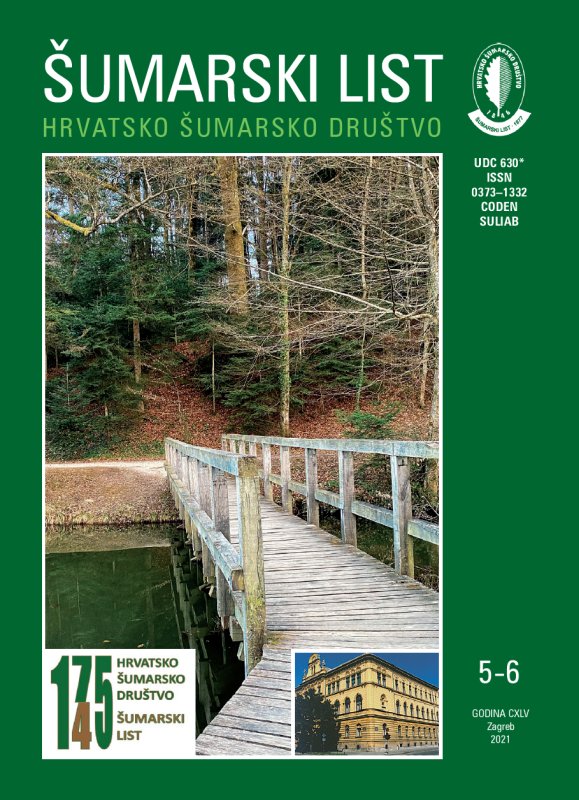
broj: 5-6/2021
pdf (15,7 MB) |
|
||||||||||||||
| RIJEČ UREDNIŠTVA | ||
| Uredništvo | ||
| The demise of a man who has devoted his life to forests and forestry pdf HR EN | 209 | |
| IZVORNI ZNANSTVENI ČLANCI | ||
| Tomislav Poršinsky, Vitomir Kajgana, Željko Tomašić, Andreja Đuka | UDK 630* 453 (001) https://doi.org/10.31298/sl.145.5-6.1 | |
| Gradeability of the cable skidder based on traction performance pdf HR EN | 211 | |
| Summary Based on the dimensional characteristics of the cable skidder (dimensions, weight, position of the center of gravity), a model was developed for estimating the mobility of the skidder during timber extraction (skidding) uphill in a safe, efficient and environmentally sound way. The model is based on the limiting slope of skidders’ mobility depending on the traction performance of the vehicle, which connects two research approaches, 1) vehicle – terrain (distribution of forces depending on the slope and load) and 2) wheel – soil (traction performance based on wheel numeric). The model is in compliance with a number of restrictions arising from previous research: i) unloading the front axle of the vehicle, ii) overloading the rear axle of the vehicle, iii) minimum longitudinal stability of the skidder, iv) minimal soil bearing capacity and v) allowed tyre load capacity. The results of the mobility of the cable skidder Ecotrac 55V equipped with 12.4-24 tires during skidding timber uphill, differ significantly with regard to the load-bearing capacity and the load size. For smaller loads, weighing up to 1 ton, the mobility of the skidder is determined by the criteria/limits of the skidder gradeability (traction performance) and environmental benefits (minimum load-bearing capacity). As the weight of the load increases, apart from the load-bearing capacity, the decisive limiting factor of mobility becomes the load ratio of the front and rear axles of the vehicle (> 1: 3.5), which limits the mobility of the skidder on slopes <33% for loads of 1.5 tons, <20% for 2 tons. At a load of 2.5 tons, the mobility of the skidder is affected by the criteria of the maximum allowable load of the rear axle of the skidder on slopes <7%. Key words: cable skidder; uphill skidding; gradeability; traction performance | ||
| Krunoslav Sever, Dimitrije Damir Sviličić, Tomislav Karažija, Boris Lazarević, Željko Škvorc | UDK 630*232.3 (001) https://doi.org/10.31298/sl.145.5-6.2 | |
| Photosynthetic response of common beech seedlings to suboptimal mineral nutrition pdf HR EN | 225 | |
| Ahmet Lojo, Jusuf Musić, Besim Balić, Admir Avdagić, Velid Halilović, Aida Ibrahimspahić, Jelena Knežević | UDK 630* 523 (001) https://doi.org/10.31298/sl.145.5-6.3 | |
| Modeling bark thickness of beech (Fagus sylvatica L.) pdf HR EN | 239 | |
| Tark Çtgez, Refik Karagül, Mehmet Özcan | UDK 630*114.1 + 116 https://doi.org/10.31298/sl.145.5-6.4 | |
| Evaluation of the effects of some watershed characteristics on water and suspended sediment yield in agricultural and forest dominated watersheds pdf HR EN | 249 | |
| PRETHODNO PRIOPĆENJE | ||
| Nediljko Landeka, Mirela Uzelac, Danijela Poljuha, Barbara Sladonja | UDK 630* 453 https://doi.org/10.31298/sl.145.5-6.5 | |
| The first record of the asiatic string cottony scale Takahashia japonica in Croatia pdf HR EN | 263 | |
| Toni Safner, Ana Gracanin, Ivan Gligora, Boštjan Pokorny, Katarina Flajšman, Marco Apollonio, Nikica Šprem | UDK 630* 461 https://doi.org/10.31298/sl.145.5-6.6 | |
| State border fences as a threat to habitat connectivity: a case study from South-Eastern Europe pdf HR EN | 269 | |
| PREGLEDNI ČLANCI | ||
| Marina Milović, Marko Kebert, Saša Orlović | UDK 630* 172.8 https://doi.org/10.31298/sl.145.5-6.7 | |
| How mycorrhizas can help forests to cope with ongoing climate change? pdf HR EN | 279 | |


